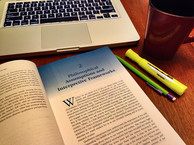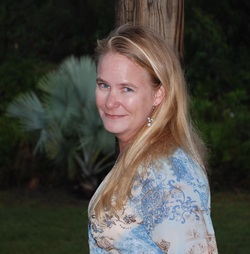
Learning to research effectively is vital when you are writing a novel. Almost every story could benefit from some level of research, but when you are writing about an unfamiliar subject, it becomes crucial. When I first started writing, I took the maxim “write what you know” to heart. However, the more stories I wrote, the harder it became to set them in places where I had lived, or about a profession, interest or sport with which I was familiar. In Positively Beautiful (Bloomsbury 2015), I launched myself into the wide unknown. I set the book in Atlanta and wrote about breast cancer and the BRCA gene, all of which was new territory for me. I was simply astounded by the amount of help that complete strangers were willing to give me. When I began researching my second young adult novel, All We Have Left (Bloomsbury 2016), I honed the lessons I learned researching Positively Beautiful. All We Have Left became the hardest book I’ve ever written, not only because of the quantity of research necessary, but also because of the subject matter, 9/11, which was heart-wrenching. But as All We Have Left goes into the galley stage, I can confidently say that it is the book that makes me the proudest. Also--I’m hooked on researching, not only because of the things I learn about the world, but because of the things I learn about myself. I don’t ever want to go back to writing simply what I know ever again.
Researching a book effectively:
1. Do not trust the internet. I repeat. DO NOT TRUST THE INTERNET. It is filled with inaccuracies and opinions stated as fact. It is not completely useless, of course, but always, always verify. University research sites, library databases, and reputable publications are generally solid, but chats, blogs, and forums are often not. Don’t overlook these latter resources, however, because they can be useful for details that are not mentioned in the more fact-filled, arid scholarly publications. But. Still. Always double-check.
2. Let the story follow your research. When I start a researching a story, I read as much as I can about my subject. And I mean anything and everything. I’m never sure what will come in useful at this stage. While I often have a general idea of my story subject, I don’t want to be nailed down to preconceived ideas, or have such a rigid outline that I cannot change things if I run across something that is absolutely meaty and relevant. The story evolves from my research. By the same token, you must be able to recognize when a meaty idea is just a tangent, and a chance for you to show off how much you researched. See number 5.
3. Do as much research hands-on as possible. It’s tempting to just sit back at your desk and do your research without the hassle of calling people or making travel plans, but nothing beats your own personal experiences. Sometimes, because of money concerns or other restrictions, this is not possible. However, if you can spend time around your subjects, or visit your book’s locale, your book will show the effort. I live in Florida, and when I was researching All We have Left, I wasn’t sure I should spend the money to travel to New York. My research was solid; why spend the money? But I found a cheap flight and was rewarded by the sensory experience of walking through the 9/11 Memorial Museum, and hiking a trail in the Shawangunk mountains. Was my original research solid? Yes. Was I able to add additional details that immeasurably added to the story? YES!
I will continue this post next Friday.
Researching a book effectively:
1. Do not trust the internet. I repeat. DO NOT TRUST THE INTERNET. It is filled with inaccuracies and opinions stated as fact. It is not completely useless, of course, but always, always verify. University research sites, library databases, and reputable publications are generally solid, but chats, blogs, and forums are often not. Don’t overlook these latter resources, however, because they can be useful for details that are not mentioned in the more fact-filled, arid scholarly publications. But. Still. Always double-check.
2. Let the story follow your research. When I start a researching a story, I read as much as I can about my subject. And I mean anything and everything. I’m never sure what will come in useful at this stage. While I often have a general idea of my story subject, I don’t want to be nailed down to preconceived ideas, or have such a rigid outline that I cannot change things if I run across something that is absolutely meaty and relevant. The story evolves from my research. By the same token, you must be able to recognize when a meaty idea is just a tangent, and a chance for you to show off how much you researched. See number 5.
3. Do as much research hands-on as possible. It’s tempting to just sit back at your desk and do your research without the hassle of calling people or making travel plans, but nothing beats your own personal experiences. Sometimes, because of money concerns or other restrictions, this is not possible. However, if you can spend time around your subjects, or visit your book’s locale, your book will show the effort. I live in Florida, and when I was researching All We have Left, I wasn’t sure I should spend the money to travel to New York. My research was solid; why spend the money? But I found a cheap flight and was rewarded by the sensory experience of walking through the 9/11 Memorial Museum, and hiking a trail in the Shawangunk mountains. Was my original research solid? Yes. Was I able to add additional details that immeasurably added to the story? YES!
I will continue this post next Friday.

 RSS Feed
RSS Feed